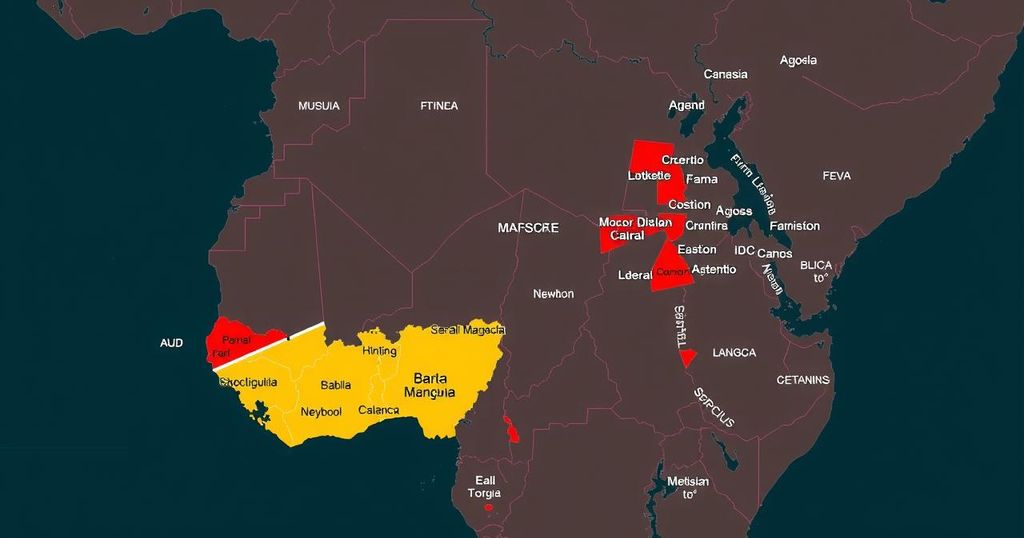Politics
AFRICA, AP, AP FOTO, CARLOS U, CARLOS UQUEIO, DANIEL CHAPO, DEMOCRACY, DURANTE LAS, ELEC, EN MAPUTO, FR, HUMAN RIGHTS, JOHANNESBURG, LA CAPITAL DE MOZAMBIQUE, LEBOMBO, LLAMAS, MAPUTO, MOZAMBIQUE, POLITICS, SOUTH AFRICA, SOUTHERN AFRICA, SOUTHERN AFRICAN DEVELOPMENT COMMUNITY, UNA, VE, VENANCIO MONDLANE, VIOLENCE
Leila Ramsay
0 Comments
Post-Election Violence in Mozambique: Implications for Southern Africa
Post-election violence in Mozambique following the Oct. 9 elections has raised concerns for Southern Africa. Protests against the ruling Frelimo party’s victory have resulted in at least 30 deaths. The unrest impacts regional stability and trade due to Mozambique’s critical economic connections with neighboring countries.
The recent elections in Mozambique have triggered widespread protests following the announcement of results favoring the ruling Frelimo party. On October 9, 2024, Daniel Chapo of Frelimo was declared the victor, leading to violent unrest that has claimed at least 30 lives. Opposition leader Venancio Mondlane, who secured 20% of the vote, has called for further demonstrations against perceived electoral injustices. This unrest poses significant concerns for regional stability, particularly in relation to the Southern African Development Community (SADC) and the potential for these tensions to affect neighboring countries. In light of the challenges faced by several Southern African nations regarding electoral integrity, the recent unrest in Mozambique highlights the fragility of democratic processes in the region. Countries such as South Africa and Botswana have demonstrated relatively stable elections, with Botswana successfully transferring power after 58 years of ruling party dominance. However, Mozambique has emerged as a focal point of electoral disputes, exacerbated by allegations from the European Union regarding voting irregularities. The socioeconomic implications of Mozambique’s instability are profound, particularly for regional trade dynamics. Its shared borders with South Africa and other nations make it a critical link in the Southern African trade network. The recent closure of the Lebombo border due to unrest has disrupted trade flows, costing South Africa substantial economic losses. Additionally, the situation places further strain on already challenged economies coping with issues such as illegal migration. Moreover, Mozambique’s historic struggles with civil conflict and insurgency continue to impede its political stability. Although it achieved the disarmament of armed groups in the 1994 elections, the persistent threat from militant groups in Cabo Delgado presents ongoing challenges. The humanitarian situation remains dire, with significant displacement prompting concerns of migration that could spill over into neighboring countries. As these dynamics unfold, it becomes increasingly critical for the SADC to address the underlying issues in Mozambique to prevent further regional destabilization.
The situation in Mozambique following the controversial October 9, 2024, elections has intensified concerns regarding political violence and democratic governance in Southern Africa. The Frelimo party, which has governed since the nation’s independence, was accused of electoral malpractices, leading to significant unrest. The regional context is marked by a history of disputed elections in neighboring countries, adding urgency to the need for effective electoral systems and political stability across the region.
In summary, the post-election violence in Mozambique is indicative of broader electoral challenges facing Southern Africa, where disputed elections threaten not only national stability but also regional economic and political dynamics. Mozambique’s pivotal role in trade and its historical context further complicate these issues. Addressing these unrests is vital for ensuring stability for Mozambique and its neighboring nations in the forthcoming SADC summit discussions.
Original Source: apnews.com




Post Comment